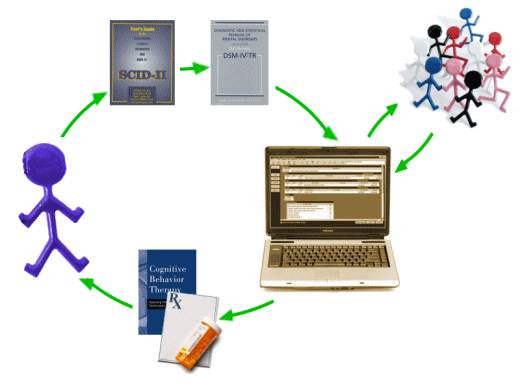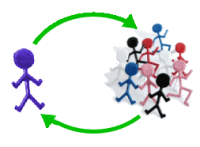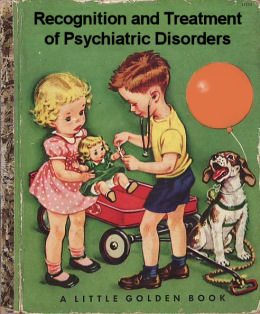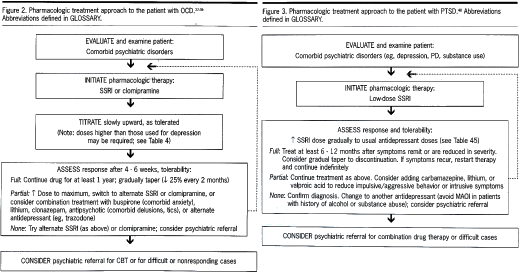|
al·go·rithm ˈælɡəˌrɪðÉ™m
–noun a set of rules for solving a problem in a finite number of steps
|
A few months back, I drew a picture to illustrate some articles I read:

A Computerized Clinical Decision Support System as a Means of Implementing Depression Guidelines
by Madhukar H. Trivedi, M.D., Janet K. Kern, Ph.D., Bruce D. Grannemann, M.S., Kenneth Z. Altshuler, M.D. and Prabha Sunderajan, M.D.
Psychiatric Services 55:879-885, August 2004.
The authors describe the history and current use of computerized systems for implementing treatment guidelines in general medicine as well as the development, testing, and early use of a computerized decision support system for depression treatment among "real-world" clinical settings in Texas. In 1999 health care experts from Europe and the United States met to confront the well-documented challenges of implementing treatment guidelines and to identify strategies for improvement. They suggested the integration of guidelines into computer systems that is incorporated into clinical workflow. Several studies have demonstrated improvements in physicians’ adherence to guidelines when such guidelines are provided in a computerized format. Although computerized decision support systems are being used in many areas of medicine and have demonstrated improved patient outcomes, their use in psychiatric illness is limited. The authors designed and developed a computerized decision support system for the treatment of major depressive disorder by using evidence-based guidelines, transferring the knowledge gained from the Texas Medication Algorithm Project [TMAP]. This computerized decision support system [CompTMAP] provides support in diagnosis, treatment, follow-up, and preventive care and can be incorporated into the clinical setting. CompTMAP has gone through extensive testing to ensure accuracy and reliability. Physician surveys have indicated a positive response to CompTMAP, although the sample was insufficient for statistical testing. CompTMAP is part of a new era of comprehensive computerized decision support systems that take advantage of advances in automation and provide more complete clinical support to physicians in clinical practice.
-
I have found the DSM to be more polemic than science. In the thirty years since it was introduced, I can think of no instance in which it helped me with a patient in my practice as a Psychiatrist [and it doesn’t seem to be iterating in that direction].
-
The extensive ties of this author with the Pharmaceutical Industry is to the shame of he and his colleagues, and makes his reliance on algorithms that recommend their products highly suspect.
-
 Eliminating the middle parts of the picture, his model says that the treatment of the mentally ill person should be directed by the results of the treatment of some group of similar people – a group from a clinical trial. While that is broadly obvious, this model elevates it to an indefensible level of importance – singular importance.
Eliminating the middle parts of the picture, his model says that the treatment of the mentally ill person should be directed by the results of the treatment of some group of similar people – a group from a clinical trial. While that is broadly obvious, this model elevates it to an indefensible level of importance – singular importance.
 I actually got those articles from a comment made when I was writing about the POGO exposure that a textbook called Recognition and Treatment of Psychiatric Disorders: A Psychopharmacology Handbook for Primary Care that was ghostwritten at the direction of a Pharmaceutical company under the names of two famous Psychiatrists [Dr. Charles Nemeroff and Dr. Alan Shatzberg] whose industry ties were as extensive as those of this author [maybe more because they were actually both in the business]. At the time, I was focusing on the ghost-writing itself, but it wasn’t lost on me that this textbook was as algorithmic as these articles from TMAP [Texas Medication Algorithmic Project]. The book was a simplistic recipe book for treating mental illness. At the time, I parodied it as a children’s book:
I actually got those articles from a comment made when I was writing about the POGO exposure that a textbook called Recognition and Treatment of Psychiatric Disorders: A Psychopharmacology Handbook for Primary Care that was ghostwritten at the direction of a Pharmaceutical company under the names of two famous Psychiatrists [Dr. Charles Nemeroff and Dr. Alan Shatzberg] whose industry ties were as extensive as those of this author [maybe more because they were actually both in the business]. At the time, I was focusing on the ghost-writing itself, but it wasn’t lost on me that this textbook was as algorithmic as these articles from TMAP [Texas Medication Algorithmic Project]. The book was a simplistic recipe book for treating mental illness. At the time, I parodied it as a children’s book: 
These things sent me on a Hegira because I realized that although I am a Psychiatrist, I knew only bits and snatches about the story I was following. I read about evidence based medicine; and then I looked into Shatzberg’s drug [Mifepristone]; I wandered through the details of the Atypical Antipsychotics and the NIMH CATIE study; I looked into the modern Clinical Research Industry, and I began to feel caught up on things. When I got to the STAR*D study, there was a surprise in store. I wasn’t surprised at all the bad science, ghost-writing, and corporate deceit I found in the industry funded literature. But I expected more from STAR*D, an NIMH production. In some ways, it was the worst of the lot because it seemed to be deliberately obfuscating the raw data. I met others who had seen it in the same way. But then I ran across a name that came from back at the start of my personal attempt to understand all of these things – Dr. Madhukar H. Trivedi of the Texas Medication Algorithmic Project. He was a big part of STAR*D, second in command to Dr. A. John Rush. Then I found out that they had had the same relationship in TMAP. Rush had been in charge. This was either getting more complicated, or a lot simpler.
Well that lead me to TMAP which as best I can tell was more than an algorithmic adventure, it was a conduit for the pharmaceutical industry to a big market that almost bankrupted Texas Medicaid [STAR*D: too important to ignore…]. It was busted by a whistle-blower suit in 2004, and in 2008 Rush suddenly left Texas and STAR*D for a job on the other side of the world – in Singapore. That happened around the time he, Nemeroff, and Shatzberg were named in Senator Grassley’s investigation of undisclosed conflicts of interest in Academic Medicine. The whistle-blower suit is still in the courts, but moving ahead. I’ll have to say that I had no idea that I’d end up back where I started. But then I was in for yet another surprise. The next study was CO-MED, another Drs. Rush and Trivedi NIMH sponsored antidepressant study, but I found out that though the clinical trial was completed over a year ago, it remains unpublished. I’ve been told it’s in the works at the American Journal of Psychiatry. I was looking for more from Rush, and it lead me to iSPOT.

I may have an inkling/guess of where this is all headed in the near future:
The ever expanding & broadening of criteria for new/old disease markets with some form of testing ( example SCID ), chemical imbalance theory’s, symptom based medicine including the likes of serotonin/dopamine neurophysiology manipulation are coming under increasing scrutiny.
A new marketing philosophy has to be introduced as ground breaking evidenced based medicine to maintain & increase use of these recycled old/new drugs.
Using the Personalized Medicine rouse with genetic mapping & bio-markers which can be manipulated through creative algorithm processes may very well be the next pharmacological revolution of PREEMPTION/Preventive psychiatric medicine (ground work for this next phase has already been intrenched cleverly in the upcoming DSM-V).
Why wait for unreliable diagnostic criteria to be met with a whole pesky series of time consuming verifiable symptoms: when you can plug a potential consumer into some predetermined bio-marker based algorithm predicting in advance mental disease before any actual presentation exist.
You can only begin to imagine the market potential of asymptomatic diagnosis & treatments?
Charles SellMan Schulz of University of Minnesota ( of Dan Markison & AstraZeneca Seroquel fame) is one of many working as an adviser for http://www.veripsych.com/ & alike ventures that will virtually make a lab tech the next generations of psychiatrist.
I know this sounds somewhat ludicrous & far fetched to some; until you look back & take serious pause on what has happen over the past 5 or 6 decades.
Does this hold any water in your view? Thoughts?
More than just “holds water,” it’s where all these stories seem to be headed to me. I don’t know what all I think about it yet, but it feels like a dowsing rod must feel over an underground river…
Of course, where there’s a marketing opportunity, Steve Stahl can’t be far behind:
http://www.cnsspectrums.com/aspx/articledetail.aspx?articleid=1441
And then there’s this Molecular Psychiatry paper from 2010: http://www.brainresource.com/uploads/Personalized_Medicine_for_the_Brain_a_call_for_Action_Koslow_Willams_Gordon.pdf. The list of participants (at the end of the article) is like a who’s-who of psychiatry.
A. John Rush, among others, is set to profit handsomely from STAR*D as co-inventor of a test for “treatment emergent suicidal ideation.†See
http://tinyurl.com/3p7nwg8